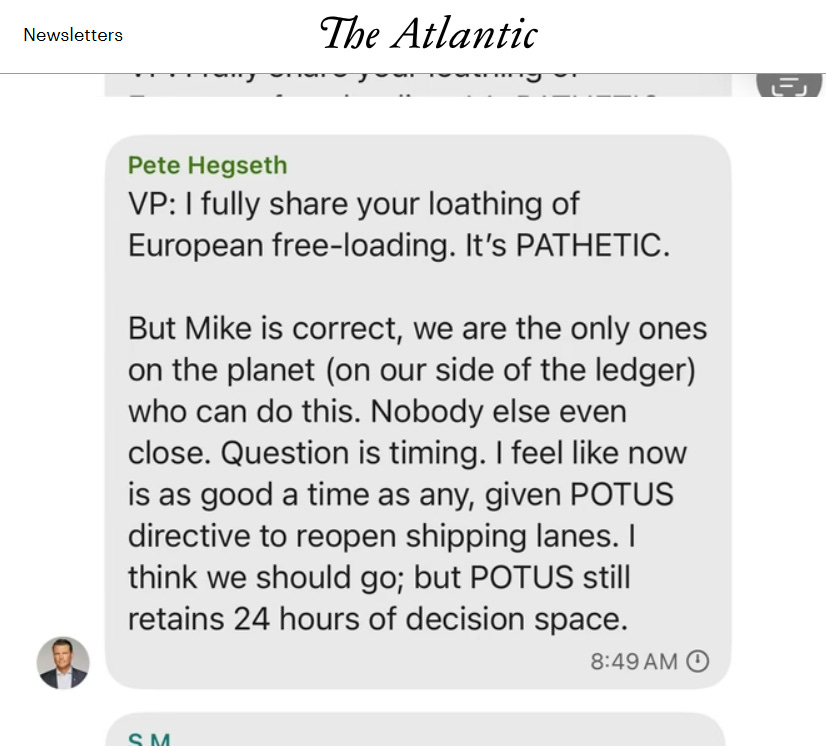Emojis, Egos, and Espionage: The Trump Administration’s Frat House Approach to National Security
National Security or Mean Girls TikTok comments? I can't tell.
The Trump administration’s recent security breach, in which a senior official accidentally included a journalist in a group chat revealing classified military plans, reads like a political satire—but it’s all too real. The ramifications of this episode are staggering, not only for national security but for the credibility of America’s leadership on the world stage.
Perhaps the most striking element in this entire debacle is the contempt expressed by senior Trump officials toward Europe. In the leaked Signal chat, it was Secretary of Defense Pete Hegseth who referred to Europe’s reliance on American military might as “pathetic.” This language isn’t just undiplomatic; it’s emblematic of an administration that openly derides its closest allies. In the same chat, top U.S. officials casually used emojis—flexed biceps, American flags, and fire icons—when discussing imminent military strikes. It’s hard to reconcile the use of emoji-laden texts with the gravity of decisions involving life, death, and geopolitical stability. National security issues were being discussed with the decorum of a group chat arranging a weekend tailgate party.
Equally alarming is the extent to which the operation against the Houthis in Yemen was staged not solely for strategic necessity but as political theater. Officials spoke openly about timing the operation for maximum optics and messaging. The vice president expressed concern over public perception and economic impact, yet conceded to proceeding for the sake of “sending a message.” This smacks of the Clinton-era decision to bomb a Sudanese pharmaceutical factory—widely criticized as a ploy to divert attention from the Monica Lewinsky scandal.
Hate Subscriptions? Me too! You can support me with a one time contribution to my research at Buy Me a Coffee. https://buymeacoffee.com/researchukraine
What becomes clear in these texts is the almost juvenile atmosphere within the highest levels of government. Discussions that should have been held in secure classified environments instead unfolded over an encrypted chat app—one that was not government-approved for sensitive communication. There is no "adult" in the room. Cabinet officials treated it like an informal chat thread, replete with casual banter and slapdash decision-making. These are the same individuals tasked with shaping U.S. foreign policy and negotiating with adversaries like Vladimir Putin. Their conduct raises serious questions about whether they possess the maturity and judgment required for these roles.
The legal violations are glaring. The use of Signal for sharing classified information likely violates provisions of the Espionage Act and federal records law. Moreover, the setting of messages to auto-delete contravenes federal archiving mandates. By adding a journalist to the chat—intentionally or not—these officials effectively leaked national defense information. In any other administration, this could prompt criminal investigations and resignations.
This incident confirms America’s worst fears about the Trump cabinet. It was a government staffed by inexperienced individuals more concerned with loyalty and image than with competence or legal propriety. Inexperienced narcissists with fragile egos now hold power over decisions with global repercussions.
The contrast with past administrations couldn’t be starker. President John F. Kennedy surrounded himself with the so-called “Whiz Kids” from the RAND Corporation—intellectual heavyweights who, despite their flaws, brought academic rigor and thoughtful analysis to policymaking. Trump’s team, by comparison, appears more like impulsive adolescents who debate strategy like one would comment on TikTok.
The implications for U.S. foreign policy are dire. If this is how the administration approaches military action in Yemen, how can Americans or our allies trust them to handle negotiations with Putin or manage crises in Taiwan or the South China Sea? Their recklessness undermines U.S. credibility and weakens deterrence.
This incident should provoke bipartisan outrage. It exposes the degradation of American governance and highlights the urgent need for competence and decorum at the highest levels of leadership. The spectacle of emoji-strewn war plans being leaked by mistake would be laughable if it weren’t so dangerous.
In the end, what’s most tragic is that the administration seemed more concerned with optics and domestic political points than with sober, responsible leadership. The world deserves better from the United States. And Americans deserve leaders who treat matters of war and peace with the gravity they demand—not as theater, not as a meme, but with wisdom, restraint, and integrity.
This is America at its weakest.
Benjamin Cook continues to travel to, often lives in, and works in Ukraine, a connection spanning more than 14 years. He holds an MA in International Security and Conflict Studies from Dublin City University and has consulted with journalists on AI in drones, U.S. military technology, and related topics. He is co-founder of the nonprofit UAO, working in southern Ukraine. You can find Mr. Cook between Odesa, Ukraine; Charleston, South Carolina; and Tucson, Arizona.
Hate Subscriptions? Me too! You can support me with a one time contribution to my research at Buy Me a Coffee. https://buymeacoffee.com/researchukraine
Mr. Cook’s Substack:
Full article at The Atlantic: https://www.theatlantic.com/politics/archive/2025/03/trump-administration-accidentally-texted-me-its-war-plans/682151/








